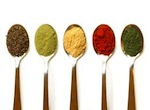More than 50% of the clients that come to visit me at the office have some form of digestive distress, be it reflux disease, irritable bowel syndrome or inflammatory bowel diseases, such as Crohns and Ulcerative Colitis. Although these conditions directly affect the gut, more than 90% of my clients require some degree of gastrointestinal support to treat their health concerns, including frequent colds, allergies, rheumatic diseases, cancer and heart disease.
At Westcoast Integrative Health, we begin by supporting peoples health concerns using a modified version of the Mediterranean diet, specific to the individual needs of our clients.
The following article outlines some of the most powerful functional food choices for supporting a healthy digestive system. Several of my favorite nutrient suggestions are in this list, including turmeric and ginger. Its definitely worth a read!
How to heal your gut using everyday spices
Posted on Natural News Monday, March 11, 2013 by Ethan A. Huff
There are many reasons why people develop gastrointestinal problems — poor diet, food sensitivities and allergies, genetically-modified organisms (GMOs), anxiety and stress are among the most common triggers. And while there is no one-size-fits-all method to treat gut-related disorders once they have already developed, there are a number of natural approaches that may provide relief beyond just removing and avoiding the triggers. Here are six everyday spices that can help heal your gut naturally without the need for pharmaceutical drugs:
1) Turmeric. One of the most medicinal spices known to man, turmeric, which is also commonly referred to as curcumin, its active ingredient, is a powerful anti-inflammatory herb that has been shown to help aid in the proper digestion of food. Because of its strong astringent qualities, turmeric can help seal the lining of the bowel and digestive tract, effectively blocking the condition commonly referred to as leaky gut syndrome.
Turmeric is also known to suppress the excess production of stomach acid, which can cause chronic stomach upset and even physical damage to the intestinal wall. And regular consumption of turmeric has been shown to help prevent gastroesophageal reflux, also known as heartburn, as well as prevent the formation of both gastric and duodenal ulcers.
2) Coriander. Not to be confused with the spice cilantro, which comes from the plant’s leaves, coriander, which is derived from cilantro seeds, contains a unique blend of volatile oils that is said to play an important role in the herb’s ability to promote digestive healing. Linalool and geranyl acetate both occur naturally in coriander, and have been implicated in treating a host of gastrointestinal disorders.
A study published in the journal Digestive Diseases and Sciences, for instance, found that patients with irritable bowel syndrome (IBS) benefited greatly from taking coriander for eight weeks as opposed to placebo. As it turns out, coriander works the same way as antispasmodic drugs to relax digestive muscles and alleviate IBS and other similar “overactive gut” disorders, but without causing harmful side effects.
3) Cumin. If bloating, indigestion, flatulence, diarrhea, or nausea characterize the state of your intestinal tract around mealtime, you might want to start taking cumin. This traditional North African spice aids in the digestion of food by stimulating the release of digestive enzymes during and after meals, and can also help generally soothe the digestive process.
Cumin contains two unique compounds known as cuminaldehyde and thymol that are essential for healthy digestion. The former helps activate the salivary glands, which break down food and prepare its nutrients for proper assimilation, while the latter prevents foods from fermenting in the digestive tract. Cumin also stimulates the digestive process by triggering the release of bile and other digestive enzymes responsible for breaking down food. (http://www.standardmedia.co.ke)
4) Fennel. Known for its licorice-type flavor, fennel is sometimes referred to as the digestive herb, and is particularly beneficial for women suffering from menstrual cramps. Rich in a volatile oil known as anethole, fennel happens to be loaded with a plethora of anti-inflammatory phytochemicals and other powerful nutrients that can help ease abdominal pain and promote healthy digestion, including in babies suffering from colic.
It is not uncommon in Indian culture to eat fennel seeds following meals, as chewing them is known to help promote the secretion of digestive and gastric juices, as well as ease stomach and intestinal inflammation. Fennel can also help increase the absorption of nutrients in the digestive tract, as well as prevent gas and bloating, thanks to its high content of aspartic acid.
5) Ginger. Ginger has long been used throughout the Orient as a remedy for indigestion, and it continues to be recognized today for its powerful ability to quell nausea and aid in the digestive process. Ginger is so beneficial for your gut, in fact, that studies have found it to be an effective remedy for both treating and preventing colorectal cancer, as well as several other types of the disease.
For everyday use, ginger has been found to ease an upset stomach, prevent diarrhea, eliminate feelings of nausea, and treat menstrual cramps. Many people, in fact, choose to take ginger rather than drugs when sailing or engaging in other activities that might cause sea or motion sickness.
6) Cayenne. Often mistakenly believed to cause digestive upset because of its intense spicy flavor, cayenne is actually a digestive soother. Not only does cayenne help stimulate the digestive process by promoting healthy muscle movement in the digestive tract, but it also helps regulate the proper production of digestive acids, aiding in the appropriate breakdown and assimilation of nutrients.
Cayenne can also help repair a damaged gut, including stomach ulcers that involve damaged intestinal lining. Many people swear by cayenne’s unique ability to literally heal damaged stomach tissue, and studies have shown that capsaicin, the primary compound found in the pepper that makes its “hot,” helps stimulate alkali, mucus secretions, and gastric mucosal blood flow, which aid in the healing of stomach ulcers.
Learn more: http://www.naturalnews.com/039436_gut_health_healing_spices.html#ixzz2NGNKFpy7
